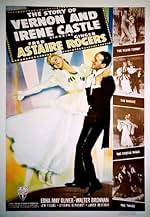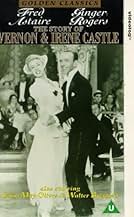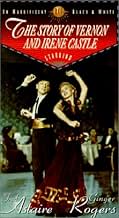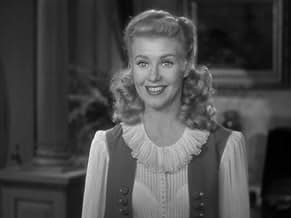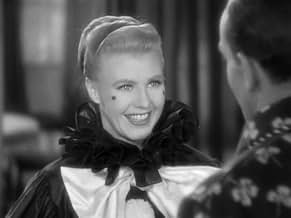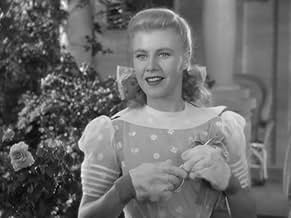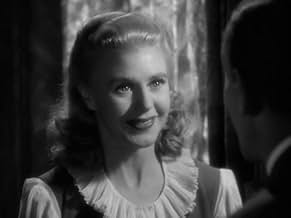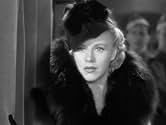IMDb RATING
6.9/10
2.9K
YOUR RATING
The story of the dancing team who taught the world to two-step.The story of the dancing team who taught the world to two-step.The story of the dancing team who taught the world to two-step.
- Awards
- 4 wins & 1 nomination total
Buzz Barton
- Undetermined Secondary Role
- (uncredited)
Max Barwyn
- Waiter - Cafe de Paris
- (uncredited)
Featured reviews
Here's one of those rare films that I like where there are no villains, just a nice, old-fashioned story with good people.
Of all the Fred Astaire-Ginger Rogers films, I would guess this gets the least amount of publicity and if that's true, it's a shame.
There are plenty of dance scenes in here. I prefer the tap dancing to ballroom, but that's just my personal tastes. The famous dancing duo are great with any style. I like Walter Brennan, so it's nice to see him in this film and it also was nice to see Edna May Oliver play a nice character, for a change.
The only complaint was the ending was so predictable. You see it coming a mile away. How true this story is, I can't say, but overall it's one of my favorite Astaire-Rogers movies. I am sorry it gets so little attention.
Of all the Fred Astaire-Ginger Rogers films, I would guess this gets the least amount of publicity and if that's true, it's a shame.
There are plenty of dance scenes in here. I prefer the tap dancing to ballroom, but that's just my personal tastes. The famous dancing duo are great with any style. I like Walter Brennan, so it's nice to see him in this film and it also was nice to see Edna May Oliver play a nice character, for a change.
The only complaint was the ending was so predictable. You see it coming a mile away. How true this story is, I can't say, but overall it's one of my favorite Astaire-Rogers movies. I am sorry it gets so little attention.
This was the last of the Astaire and Rogers films at RKO (they would reunite at MGM for "The Barkeleys of Broadway" [1949]), and represents the studio attempting to find a new way to make the duo popular. It's hard to believe, since the pair have become legends in Hollywood musical history, but by the end of the 1930s audience interest in Astaire and Rogers seemed to be ebbing. Consequently, this film feels *very* different than the rest of their films.
This is not a story of boy meets girl/boy dances with girl/boy loses girl/boy chases and chases girl/boy gets girl and dances with her again. There aren't a ton of the whimsical oddball comic supporting players. And--steady yourself--there are very few full-out major musical numbers. There is no stunning score of songs by Irving Berlin or the Gershwins.
This is because this is a musical biography about the Astaire and Rogers of the previous generation. Hence, the duo are asked not to dance in the manner that made them popular but in the manner that made *the Castles* popular, and to music that *that* couple danced to. Often, when the two dance, we are interrupted by various plot points (ie., cutting to other characters talking instead of keeping the camera on the dancers). One of the few moments where we are able to enjoy them completely is a montage sequence showing the Castles becoming the toast of the nation (with Astaire and Rogers literally dancing across a giant map of the U.S.)
The other major musical number is a solo: Ginger Rogers singing "The Yama Yama Man." Astaire was about to end his contract at RKO, but Rogers still was under contract--so the studio is plainly more interested in trying to build up Rogers for a solo career, and the film indicates this (Rogers' solo, the emphasis on her clothes and hair, etc.) Meanwhile, the film also indicates a growing awareness of the coming war, by dealing with Vernon Castle's enlistment during World War I--one of the first times Astaire had donned a uniform for the cameras (something he would do a *lot* in musicals for the next 5 years).
All in all, it's not what one usually expects from an Astaire and Rogers film, and thus suffers in comparison to "Top Hat" or "Shall We Dance," but still retains a charm and personality nonetheless.
This is not a story of boy meets girl/boy dances with girl/boy loses girl/boy chases and chases girl/boy gets girl and dances with her again. There aren't a ton of the whimsical oddball comic supporting players. And--steady yourself--there are very few full-out major musical numbers. There is no stunning score of songs by Irving Berlin or the Gershwins.
This is because this is a musical biography about the Astaire and Rogers of the previous generation. Hence, the duo are asked not to dance in the manner that made them popular but in the manner that made *the Castles* popular, and to music that *that* couple danced to. Often, when the two dance, we are interrupted by various plot points (ie., cutting to other characters talking instead of keeping the camera on the dancers). One of the few moments where we are able to enjoy them completely is a montage sequence showing the Castles becoming the toast of the nation (with Astaire and Rogers literally dancing across a giant map of the U.S.)
The other major musical number is a solo: Ginger Rogers singing "The Yama Yama Man." Astaire was about to end his contract at RKO, but Rogers still was under contract--so the studio is plainly more interested in trying to build up Rogers for a solo career, and the film indicates this (Rogers' solo, the emphasis on her clothes and hair, etc.) Meanwhile, the film also indicates a growing awareness of the coming war, by dealing with Vernon Castle's enlistment during World War I--one of the first times Astaire had donned a uniform for the cameras (something he would do a *lot* in musicals for the next 5 years).
All in all, it's not what one usually expects from an Astaire and Rogers film, and thus suffers in comparison to "Top Hat" or "Shall We Dance," but still retains a charm and personality nonetheless.
How strange to contemplate the enormous popularity of Vernon and Irene Castle before World War I and to realize that, without this film, no one would know who they are today. I hope the same is never true of Fred Astaire and Ginger Rogers' teaming. Because of their presence on film in ten movies, it shouldn't.
Based on two Irene Castle books, this movie has more plot and more drama than the other Fred and Ginger pairings, and if you can accept that it isn't "Flying Down to Rio," "Top Hat," or "Swing Time," you'll enjoy it. Ginger Rogers does a great job as Irene, in the more dramatic of the two roles, proving again what a wonderful actress she was. The dancing was, of course, great. Ginger's gowns were actually copies of Irene's trendsetting gowns. Irene's hairstyle was well-known as well, and she wanted Ginger to dye her hair dark to match her own. But Rogers refused.
Vernon and Irene, during their short pairing, introduced many dances to the public, including the "Castle Walk" and the fox trot.
The movie's ending is a sad one, but I can't agree with another poster than the final visual was trite. I kind of liked it.
Based on two Irene Castle books, this movie has more plot and more drama than the other Fred and Ginger pairings, and if you can accept that it isn't "Flying Down to Rio," "Top Hat," or "Swing Time," you'll enjoy it. Ginger Rogers does a great job as Irene, in the more dramatic of the two roles, proving again what a wonderful actress she was. The dancing was, of course, great. Ginger's gowns were actually copies of Irene's trendsetting gowns. Irene's hairstyle was well-known as well, and she wanted Ginger to dye her hair dark to match her own. But Rogers refused.
Vernon and Irene, during their short pairing, introduced many dances to the public, including the "Castle Walk" and the fox trot.
The movie's ending is a sad one, but I can't agree with another poster than the final visual was trite. I kind of liked it.
Do people watch Astaire and Rogers films for more than the pleasure of their dancing and singing? Both performed the dialog parts in their musical comedies well too, but most people think of their movies as a series of opportunities to see great dance numbers and to hear music by Gershwin, Kern, Berlin, Porter, or Youmans. I doubt if they recall the plots.
"Flying Down To Rio" deals with a traveling orchestra that assists in advertising a hotel in Rio De Janairo. Nobody recalls that, but they recall Youmans' melody "Orchids in the Moonlight" and his dance (for Astaire and Rogers) "The Carioca". They also remember the big production number of the young women on the airplane wing ("Ah, Rio, Rio by the Sea - Oh!"). Except for that, few recall the hero is Gene Raymond and the heroine is Delores Del Rio. The running gag of the three agents of the bank that is trying to sabotage the new hotel (and who are only seen as top hatted shadows) may be recalled - but it isn't really worth recalling.
In the later musicals the same problems exist. The story of "Gay Divorcée" (originally "Gay Divorce" on Broadway) is how Rogers hires Eric Rhodes to be found with her at a resort hotel so her husband can have grounds for divorce. The Porter score including "Night and Day" and "The Continental" was good - but who recalls the plot (though Rhodes is very funny as the perpetual hired "other man" for instant divorces. The final irony of the plot (almost like a flat joke's punch line) is that Eric Blore knows a nasty secret about the husband, who (for his own reasons) does not want a divorce.
The series did try to tie the couple down to more than frivolous plots dealing with mistaken identities or fake personalities. FOLLOW THE FLEET and CAREFREE tried to have plots dealing with sailors putting on a show and with a psychologist falling in love with a patient who was engaged to his best friend (Ralph Bellamy, of course). Both were amusing, but rather slapdash. CAREFREE had a curious concluding moment, when a hypnotized Rogers is literally slapped out of her state of hypnosis. Rogers looks like she has been the victim of domestic violence as she is married.
By 1939 Astaire and Rogers were tired of the series, and wanted to go their separate ways. The public was also getting tired of the series. So finally they were given a property that reversed the formula. Instead of the music and dancing ornamenting a bare plot, the plot incorporated the music and dance by telling the story of the greatest ballroom dance team of the first half of the 20th Century, Vernon and Irene Castle.
I have often felt that had Vernon Castle lived beyond 1917 into the period of talkie movies, and stayed married to Irene, they might have been in some of the Astaire Rogers films (the choreography of two rival couples dancing would have been fascinating). Vernon might have played a mentor or rival or father to Fred. But it wasn't to be. As the film shows Vernon (who was English-born) enlisted in the Air Corps in 1917, and was killed in a freak accident saving the life of a pilot he was training (the scene in the film is quite savage in showing the crash).
In the four years (1913 - 1917) when they swept the world with their mastery of dancing, Vernon and Irene Castle became leading celebrities. The film follows the slow steps to fame they took, including getting stuck for awhile in Paris because Vernon was hired only to be a comic actor, not to be a dancer. It shows how Edna Mae Oliver (as their agent and friend) gets them the breaks they deserve, and how they end as figures of social change (ballroom dancing regained popularity, and they did create not only fashions for men and women but also "the Castle Walk" dance step). That this all happened in four years suggests what their impact would have been if they lived into the 1940s together (Irene Castle died in the 1960s).
There are some delightful moments in the film: Ginger Rogers auditioning for her date Fred Astaire by doing "Yama Yama Man" complete with a costume in her parlor. She is imitating the originator of the song, Bessie McCoy. Walter Brennan trying to protect Rogers from Astaire (whose intentions he constantly suspects). Watch him in a small scene watering the grass of the lawn, and ignoring Astaire's questions. Oliver noticing the rhythmic swaying of the overhead lamp in her apartment due to the dancing going on upstairs (where Fred and Ginger are dancing). But what is best is the feeling of impending doom over the couple. We know Vernon is going to die so that means their success and their life together will end soon.
This sense of doom makes "The Story of Vernon and Irene Castle" unique among the Astaire - Rogers films - it is a downer. There is no getting away from the loss of happiness Irene Castle suffered, nor the loss of talent the theater and dance world suffered. The concluding moment of the film always haunted me - Irene and Vernon dancing in spirit together, twirling in a never-ending, eventually disappearing embrace. When I saw the film the first time, Irene Castle was still alive. The second time she was gone but the two stars were still living. Now Fred and Ginger are gone too. That final ghostly dance manages to encompass two sets of dance legends, and increases the sadness that surrounds this - to me - best of their films.
"Flying Down To Rio" deals with a traveling orchestra that assists in advertising a hotel in Rio De Janairo. Nobody recalls that, but they recall Youmans' melody "Orchids in the Moonlight" and his dance (for Astaire and Rogers) "The Carioca". They also remember the big production number of the young women on the airplane wing ("Ah, Rio, Rio by the Sea - Oh!"). Except for that, few recall the hero is Gene Raymond and the heroine is Delores Del Rio. The running gag of the three agents of the bank that is trying to sabotage the new hotel (and who are only seen as top hatted shadows) may be recalled - but it isn't really worth recalling.
In the later musicals the same problems exist. The story of "Gay Divorcée" (originally "Gay Divorce" on Broadway) is how Rogers hires Eric Rhodes to be found with her at a resort hotel so her husband can have grounds for divorce. The Porter score including "Night and Day" and "The Continental" was good - but who recalls the plot (though Rhodes is very funny as the perpetual hired "other man" for instant divorces. The final irony of the plot (almost like a flat joke's punch line) is that Eric Blore knows a nasty secret about the husband, who (for his own reasons) does not want a divorce.
The series did try to tie the couple down to more than frivolous plots dealing with mistaken identities or fake personalities. FOLLOW THE FLEET and CAREFREE tried to have plots dealing with sailors putting on a show and with a psychologist falling in love with a patient who was engaged to his best friend (Ralph Bellamy, of course). Both were amusing, but rather slapdash. CAREFREE had a curious concluding moment, when a hypnotized Rogers is literally slapped out of her state of hypnosis. Rogers looks like she has been the victim of domestic violence as she is married.
By 1939 Astaire and Rogers were tired of the series, and wanted to go their separate ways. The public was also getting tired of the series. So finally they were given a property that reversed the formula. Instead of the music and dancing ornamenting a bare plot, the plot incorporated the music and dance by telling the story of the greatest ballroom dance team of the first half of the 20th Century, Vernon and Irene Castle.
I have often felt that had Vernon Castle lived beyond 1917 into the period of talkie movies, and stayed married to Irene, they might have been in some of the Astaire Rogers films (the choreography of two rival couples dancing would have been fascinating). Vernon might have played a mentor or rival or father to Fred. But it wasn't to be. As the film shows Vernon (who was English-born) enlisted in the Air Corps in 1917, and was killed in a freak accident saving the life of a pilot he was training (the scene in the film is quite savage in showing the crash).
In the four years (1913 - 1917) when they swept the world with their mastery of dancing, Vernon and Irene Castle became leading celebrities. The film follows the slow steps to fame they took, including getting stuck for awhile in Paris because Vernon was hired only to be a comic actor, not to be a dancer. It shows how Edna Mae Oliver (as their agent and friend) gets them the breaks they deserve, and how they end as figures of social change (ballroom dancing regained popularity, and they did create not only fashions for men and women but also "the Castle Walk" dance step). That this all happened in four years suggests what their impact would have been if they lived into the 1940s together (Irene Castle died in the 1960s).
There are some delightful moments in the film: Ginger Rogers auditioning for her date Fred Astaire by doing "Yama Yama Man" complete with a costume in her parlor. She is imitating the originator of the song, Bessie McCoy. Walter Brennan trying to protect Rogers from Astaire (whose intentions he constantly suspects). Watch him in a small scene watering the grass of the lawn, and ignoring Astaire's questions. Oliver noticing the rhythmic swaying of the overhead lamp in her apartment due to the dancing going on upstairs (where Fred and Ginger are dancing). But what is best is the feeling of impending doom over the couple. We know Vernon is going to die so that means their success and their life together will end soon.
This sense of doom makes "The Story of Vernon and Irene Castle" unique among the Astaire - Rogers films - it is a downer. There is no getting away from the loss of happiness Irene Castle suffered, nor the loss of talent the theater and dance world suffered. The concluding moment of the film always haunted me - Irene and Vernon dancing in spirit together, twirling in a never-ending, eventually disappearing embrace. When I saw the film the first time, Irene Castle was still alive. The second time she was gone but the two stars were still living. Now Fred and Ginger are gone too. That final ghostly dance manages to encompass two sets of dance legends, and increases the sadness that surrounds this - to me - best of their films.
The Story of Vernon and Irene Castle is the last of the 9 RKO musicals Astaire did with Rogers. However, from a story point-of-view, it is their best film by a mile. The contest isn't even close, IMO.
It's not their best musical. This film is really a drama with a few musical interludes, whereas most of the other Astaire-Rogers films were musical comedies. Those other films had flimsy plots at best and were saved only by their songs and dances. BUT - "Vernon and Irene" could easily stands alone without any songs or dances. It even has some action sequences as is typical of war-time films (WWI, in this case).
The film is a bio-pic about the Castles, who in their heyday were even bigger than Astaire and Rogers. The choreography is more attuned to 1910's sensibilities than the usual Astaire and Rogers film, but that's okay. Astaire and Rogers dance just well as always.
As the dancing duo's last RKO film, V&C is quite classy and a fine close to a great RKO dancing career for the two.
It's not their best musical. This film is really a drama with a few musical interludes, whereas most of the other Astaire-Rogers films were musical comedies. Those other films had flimsy plots at best and were saved only by their songs and dances. BUT - "Vernon and Irene" could easily stands alone without any songs or dances. It even has some action sequences as is typical of war-time films (WWI, in this case).
The film is a bio-pic about the Castles, who in their heyday were even bigger than Astaire and Rogers. The choreography is more attuned to 1910's sensibilities than the usual Astaire and Rogers film, but that's okay. Astaire and Rogers dance just well as always.
As the dancing duo's last RKO film, V&C is quite classy and a fine close to a great RKO dancing career for the two.
Did you know
- TriviaIrene Castle served as a technical advisor on the film. According to Ginger Rogers, Castle disliked every costume she wore and deemed them anachronistic. Due to censorship restrictions, Rogers' costumes evoked late 1930s fashions rather than the more daring styles of Castle's 1910s era. After Rogers refused to bob her hair to portray the hairstyle that Irene had popularized, Castle became more displeased. The studio silenced Castle's protests with an additional payment of $5,000.
- GoofsThe film erroneously depicts the Castles touring with white orchestras. In actuality, Vernon and Irene Castle always toured with a black orchestra; specifically, James Reese Europe's Society Orchestra.
- Quotes
Irene Castle: I thought you could be a first dancer, a very beautiful first dancer because you are a beautiful dancer but you're so smug and conceited that you can't see any further than your funny nose!
- ConnectionsFeatured in Fred Astaire: Puttin' on His Top Hat (1980)
- SoundtracksOnly When You're in My Arms
(1939)
by Con Conrad - Herman Ruby Bert Kalmar
Sung by Fred Astaire (uncredited)
End dance: Fred Astaire (uncredited) and Ginger Rogers (uncredited)
- How long is The Story of Vernon and Irene Castle?Powered by Alexa
Details
- Release date
- Country of origin
- Language
- Also known as
- The Story of Vernon and Irene Castle
- Filming locations
- Production company
- See more company credits at IMDbPro
Box office
- Budget
- $1,196,000 (estimated)
- Runtime
- 1h 33m(93 min)
- Color
- Aspect ratio
- 1.37 : 1
Contribute to this page
Suggest an edit or add missing content

